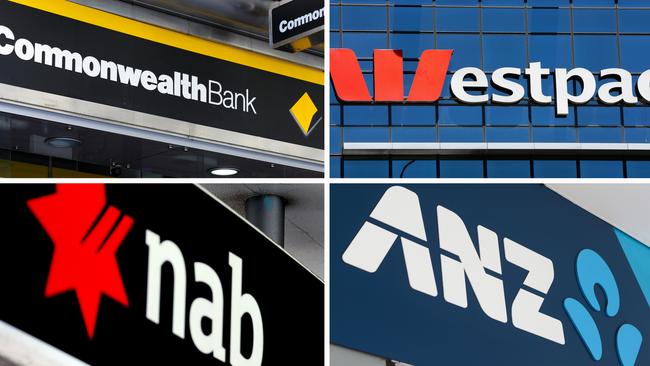Statistics reveal Aussie homeowners being stung by huge bank ‘loyalty tax’
Countless Australian mortgage holders are being slugged an extra $6000 per year by their bank – for one infuriating and unnecessary reason.
Banking
Don't miss out on the headlines from Banking. Followed categories will be added to My News.
In Australia, there’s a clear bank ‘loyalty tax’ that can be seriously costly.
This loyalty tax comes about because the banks are often competing for new business customers, so they offer deals and better pricing to entice people to move their mortgage.
But once you’re an existing customer you don’t get the same love, and as a result, typically your mortgage interest rate will become less competitive over time.
Basically, the short version is that if you set up a mortgage and then don’t change it for a number of years, you’re probably paying more than you have to.
The statistics show that the difference between the interest rate offered for new customers versus existing in Australia ranges between 0.5 per cent and 1 per cent.
Paying 0.5 to 1 per cent more in interest costs on the average Australian mortgage size of $611,000 means paying between $3000 and $6000 more in interest every single year.
The statistics show that the longer you’ve held your current mortgage, the greater the loyalty tax can become. That means that if you haven’t reviewed your mortgage in a number of years, you’re probably paying more than you have to.

If you want to maximise the money you have available for investing and wealth building – not to mention just having more money to keep today – you need to keep your mortgage interest rates competitive.
A good mortgage broker can help
One of the main jobs of a mortgage broker is to make sure you’re getting the best deal on your mortgage.
The advantage of using a mortgage broker over going directly to a bank is that a broker will be able to look across a large number of banks and shop around to keep your mortgage interest rate as low as possible.
That means when you’re looking for a property, by getting a better interest rate, your affordability can increase.
Further, because a broker will be across all of the different lending options available, they may even be able to increase your borrowing capacity by leveraging the different policies of different banks.
In addition to this, a good mortgage broker can also help you figure out how much of a deposit you need, which is particularly important when buying your first property.
They can also help you understand which homebuyer schemes and grants you might be eligible for to help shape up your property purchase strategy and timelines.

Then once you own property, a good mortgage broker will be reviewing your mortgage regularly to keep things competitive. A good broker will check in on your mortgage periodically, ensuring you’ve got the best rate. They can negotiate with your existing bank to get you a sharper deal without having to switch your mortgage, or they can help you switch if that’s going to be more beneficial.
You need to plan smartly and manage your risk
It’s worth noting here that you should only use a mortgage broker in conjunction with having a solid plan for your property purchase. Borrowing as much money as the bank will lend you can lead to higher levels of risk, so it generally isn’t the best strategy.
Any time you borrow, you should take the time to assess how your borrowing and property purchase will fit with your financial situation, not just tomorrow or next month, but into the years ahead as things change. This is particularly important for anyone with upcoming lifestyle goals like starting a family, starting a business or changing jobs and careers. These are all great things to do, but they also can have a big impact on your money and ability to fund debt repayments.
Are mortgage brokers conflicted?
Mortgage brokers are paid by the bank in the way of a commission payment when they help you set up a new mortgage.

This commission can seem like a bit of a conflict for two reasons. Firstly, you might be wondering if your mortgage would be cheaper if you went directly to the bank. And secondly, if your broker gets paid more when you borrow more, they could push you to borrow at a higher level.
But firstly, the interest rate and cost of your mortgage whether you go directly to a bank or through a broker is exactly the same. In fact, it’s often cheaper going through a mortgage broker because they’re able to negotiate a better deal with the bank on your behalf.
In terms of the second point, my opinion is that you need to take personal responsibility and accountability for your property purchase. Your plan is the only thing that should drive when and how much money you invest into property and how much you borrow.
Any time you purchase a property, you should be setting a clear strategy first and then executing on that strategy. This means it shouldn’t matter what anyone is telling you – instead, the thing that really matters is what the numbers say.
The wrap
When you keep your mortgage competitive, you have more money you can save, invest or spend today. And given the size of the Australian bank loyalty tax, if you want to maximise your savings, you need to be on top of this.

Property is a powerful way to get ahead, but mortgage repayments are also one of the biggest line items in most people’s spending, so you need to be smart with your approach.
Review your mortgage regularly and get a quality mortgage broker in your corner to make getting ahead (or keeping up) easier.
If you want to review your existing mortgage and see how much money you can save, you can use our free mortgage comparison tool here.
Ben Nash is a finance expert commentator, podcaster, financial adviser and founder of Pivot Wealth, and author of soon-to-be-released book, Virgin Millionaire. He runs regular money education events to help you save more and invest smarter. You can check out all the details and book your place here.
Disclaimer: The information contained in this article is general in nature and does not take into account your personal objectives, financial situation or needs. Therefore, you should consider whether the information is appropriate to your circumstances before acting on it, and where appropriate, seek professional advice from a finance professional.
Originally published as Statistics reveal Aussie homeowners being stung by huge bank ‘loyalty tax’





